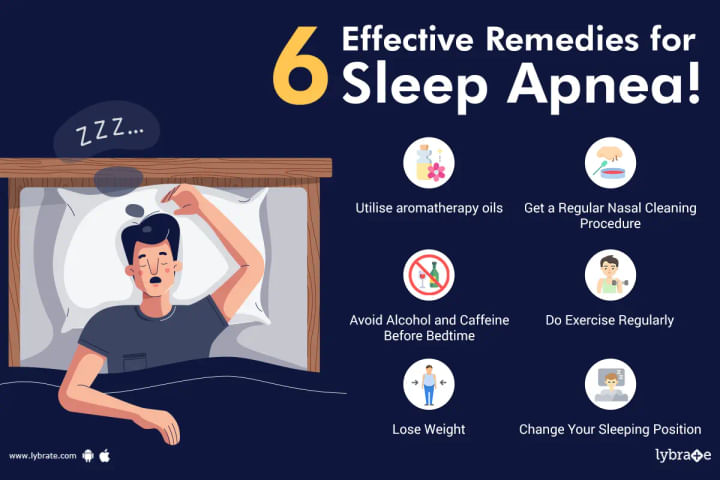8 Home Remedies for Sleep Apnea
What is sleep apnea?
Sleep apnea is a sleep disorder characterised by pauses in breathing during sleep. These pauses, called apneic events, usually last between 10 to 20 seconds and occur when the muscles of the throat relax too much and make it difficult for air to pass through.
A lack of oxygen can then enter into the bloodstream as a result. The breathing can eventually restart but these episodes can cause disruption to one's sleep at night, leading to excessive daytime fatigue, snoring and irritability. Common types of sleep apnea include obstructive sleep apnea (OSA) and central sleep apnea (CSA).
What are the signs and symptoms of sleep apnea?
Sleep apnea is a disorder that causes your breathing to become repeatedly interrupted during sleep.
Those with sleep apnea may experience loud, habitual snoring, frequent pauses in their breathing, and excessive daytime sleepiness.
Other signs and symptoms include dry mouth and sore throat upon waking, morning headaches, difficulty concentrating or irritability throughout the day, insomnia or awakening feeling unrefreshed.
What are possible complications of sleep apnea?
Sleep apnea is a condition in which breathing repeatedly stops and starts during sleep. This can lead to a number of health complications, including:
- Increased risk of high blood pressure: Repeated pauses in breathing throughout the night can lead to an increase in blood pressure, which puts extra strain on your cardiovascular system.
- Higher risk of stroke or heart failure: Due to the increased strain on the cardiovascular system from high blood pressure, having sleep apnea increases your chances of having a stroke or heart failure.
- Increased stress levels: Chronic fatigue caused by lack of sleep can create additional stress on both your mind and body, leading to mood swings and depression.
- Weight gain: Fatigue caused by poor quality sleep can cause you to be less active during the day, leading to an increase in weight gain.
- Diabetes: Studies have shown that people with sleep apnea may be at an increased risk of developing diabetes due to impaired glucose tolerance and insulin resistance associated with poor quality sleep.
By recognizing these potential complications associated with untreated sleep apnea, it is important for individuals who suffer from this condition get properly tested and treated so they can minimise their risk for potential future health problems.
8 Home Remedies for Sleep Apnea
- Change Your Sleeping Position: While sleeping, your airways can become blocked. To keep your airways open, try sleeping on your side or stomach rather than your back, which can help reduce snoring and improve respiratory function.
- Lose Weight: Being overweight or obese is one of the main risk factors for sleep apnea. Losing just 10% of your body weight can improve symptoms or even completely resolve sleep apnea in some cases.
- Exercise Regularly: Exercise helps with weight loss, but it may also help improve breathing and keep the upper airway muscles functioning properly while you sleep. Aim for at least 30 minutes of moderate-to-vigorous exercise per day if you have sleep apnea.
- Avoid Alcohol and Caffeine Before Bedtime: Drinking alcohol before bed relaxes the muscles in the back of the throat too much, limiting its ability to stay open during sleep and aggravating symptoms of sleep apnea. Caffeine should be avoided as well since it keeps you from falling asleep soundly and may worsen other symptoms like snoring or oxygen deprivation during the night.
- Quit Smoking: Smoking cigarettes increases inflammation in the upper respiratory tract and decreases oxygen levels throughout the body – both factors that increase risk for worsening sleep apnea symptoms or having more severe episodes during the night.. Quitting smoking is one of the best things you can do if you have sleep apnea to improve quality of life overall as well as breathing while asleep!
- Reduce Allergens in Your Bedroom: Allergens such as mould spores and pet dander can irritate airways while sleeping making it harder to breathe properly – contributing to symptoms or episodes associated with sleep apnea throughout the night. It’s important to keep these allergens at bay by cleaning often (especially bedding) and keeping animals out of bedrooms if possible for relief from nighttime symptoms due to stuffy nose/throat making it tougher to breathe normally when lying down & actually falling asleep comfortably!
- Use a Humidifier During Sleep: If your bedroom is too dry air can cause irritation in throat causing difficulty breathing; this is especially true for those who suffer from allergies., using a humidifier helps maintain moisture in room/encouraging better airflow lessening chances of nasal passages becoming restricted & aiding people chide w/sleep apnea get a better night's rest!
- Get Regular Nasal Cleaning Procedure (Nasal Irrigation): A procedure that involves irrigating nasal passages with saline solutions helps remove congestion build up allowing easier breathing; this type treatment proves especially beneficial those suffering allergies which aggravate their episodes related obstructive sleep disorder even further -- proper cleaning done regularly enables them find relief their condition improving their quality life drastically thereafter!
- Pay attention to snoring triggers such as eating late at night or lying down right after meals, which may obstruct the respiratory tract leading to difficulty in breathing resulting in snoring or apnea attacks
- Utilise aromatherapy oils such as lavender oil, eucalyptus oil etc for promoting better sleep quality without breath interruptions
What are the surgical treatments for sleep apnea?
Surgical treatments for sleep apnea involve obstructing or modifying the airway to prevent airflow disruptions during sleep. The various surgical treatments available are:
- Uvulo-palato-pharyngoplasty (UPPP): This procedure involves removing the excess tissue in the back of the throat, including the tonsils and adenoids, and reducing excess tissue at both the nose and mouth.
- Maxillomandibular advancement (MMA): This procedure entails realigning your jawbone forward and anchoring it into a new position.
- Radiofrequency ablation: Here, specialised instruments are used to heat up tissues around your airways and limit their vibration.
- Hyoid Suspension: A titanium implant is used to attach your hyoid bone in the middle of your neck to bone anchors in your skull; this pulls up space for airflow in affected areas.
- Other procedures include genioglossus advancement, partial glossectomy, midline glossectomy, Coblation tonsillectomy, nasal reconstruction surgery, tracheostomy etc., which all aim to improve airway patency for better sleep quality.
Best doctors to consult for sleep apnea?
- The best doctors to consult for sleep apnea are doctors who specialise in disorders such as sleep medicine, pulmonology, or otolaryngology.
- Ent specialist: They should be knowledgeable about the diagnosis and treatment of sleep apnea and have experience treating patients with this condition.
- Dietician: It may also be beneficial to look for a doctor who is able to integrate different types of treatments (including lifestyle changes, medications, medical devices and surgical procedures) into a comprehensive care plan tailored to the individual patient’s needs.



+1.svg)
